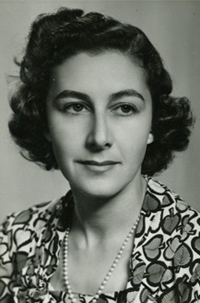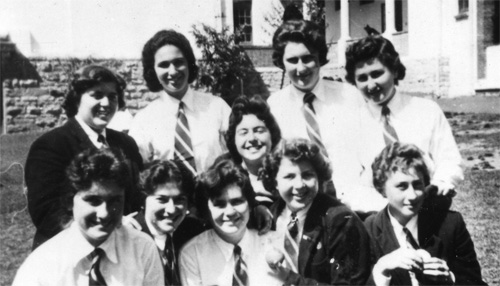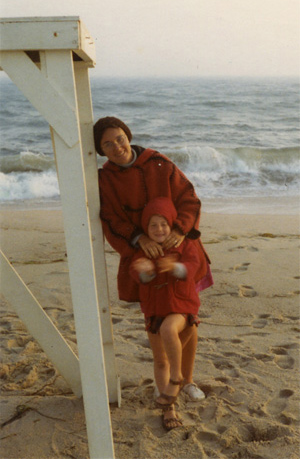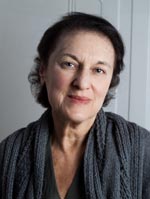Life
Though I emigrated at the age of twenty-two, the seascape of Cape Town and the sharpness of African shadow were too deeply implanted for me to be anything other than a creature of that place. My father practised as a lawyer but was better known as a sportsman and sports commentator on the SABC. "Over to Harry at Hartleyvale," we would hear on the radio on Saturdays, and then my father's cheery voice on the air. My mother, Rhoda, was a writer, primarily a poet – she thought in images - but her poetry was unpublished. This was her wish. She simply felt alien to her time, though you wouldn't have known this from the civility of her manner. Her diffidence should have given her away because it was ridiculous – but for women of her generation, in that most colonial of towns, insignificance was so much the norm that no one blew her cover – unless she chose to reveal what she was. As with Emily Dickinson, poetry was a secret life, and the poems lie still in what we jokingly called her "runaway basket". Hers was also a spiritual life, a liberation from an illness which she conceived as a series of "tests", along the lines of Abraham's tests of faith in the Bible. In her middle years she taught the Bible to a variety of classes in different parts of Cape Town. The third chapter of Shared Lives conveys some idea of her remote childhood on the veld, and the impact of her visionary character.

At the age of four I was told that instead of going to nursery school I was to be the "sister" she had always wanted. It meant being her carer – and sharer of her favourite books whom she treated as lifelong friends. She lived with them, cherished and reread them – whether it was poetry or Buber's I and Thou or women's writing. As a semi-invalid she rarely went out. I think of Virginia Woolf's words in her essay "On Being Ill" in relation to my mother: "great oaks are uprooted in us by the act of illness." Later, as Rhoda became more religious, her opinions were less devastating, but as a child I heard of racist cruelty, of the absurd vanities of power and absurder treatments of women, of "getting and spending" in the face of poverty– this dark world was the obverse of a hovering sublimity ("I am never alone", she said), and to have entrée to these regions was part of the privilege of being Rhoda's "sister" rather than her child: an initiation into a secret life far removed from her outward aspect as "a housewife at the bottom of Africa".
Her secret has stayed with me all my life, appointed from an early age to transmit her work and the meaning of her existence. I would urge her from time to time: "Publish. Don't leave it to me." But she did leave it, and ever since her death in November 1999 this challenge remains.
Apart from English, and some Cicero and Virgil, school was empty compared with the stimulus and worry of my mother's room. School mattered only for friendships with Romy Gevint and other girls of our generation, the last virgins, whose stories are told in Shared Lives.

Adult life began with expatriation. Given the unacceptable laws of apartheid, emigration had long been inevitable. In this I was no different from many of my contemporaries who understood, as we grew up, that we would have to leave South Africa. In New York, I proved bad, seriously bad, at adapting, though in retrospect see that the years there, from 1965-76, first as a graduate student, then as a teacher at Columbia University, gave a direction I couldn't have anticipated – having left South Africa with all sorts of limitations (looks, brains, confidence) which had seemed defining.
Columbia in 1968 was the scene of a student uprising in protest against the "military-industrial complex", war-making, and the Vietnam war in particular. It was a time when the buzzword on campus was "wild" (in the sense of original, "subversive", "opting out"). In this climate of protest, "women's liberation" began. I attended the first meeting called by Kate Millet. Hordes of women appeared to have crawled out of their burrows, so many they seemed to be hanging from the chandeliers. I stood on a bench against the wall together with a fellow-member of Carolyn Heilbrun's class on the novel where women's issues had come to the fore – we used to continue to discuss them with Heilbrun at the top of stairs on the sixth floor – the English floor - in Philosophy Hall.

A year or two later, at thirty, I edited a "Special Women's Issue" of a New York poetry magazine called The Little Magazine. Ironic nineteenth-century illustrations set off contributions from Mary Gordon and Marge Piercy, an interview with Denise Levertov, and a letter from Elizabeth Bishop who deplored women's writing as a separate thing. This Special Issue (Fall-Winter 1971-72) proved timely; it sold double the usual number.
Another phase of the expatriate existence came in 1973 with a move to Oxford as a Rhodes Fellow for two years at St Hilda's College. A few years before Rhodes scholarships were opened to women, the Rhodes Trust instituted research fellowships at what were then the five women's colleges in the university. There was teaching on offer, and in between I rewrote my first book, Eliot's Early Years, published in 1977. Soon after, I became a lecturer in English at Jesus College. I loved the reciprocity of the tutorial system, and there was much to be learnt – both from the students and from the senior English tutor, Colin Williamson. Watching him run Open Days and interview sixth-form candidates was a kind of apprenticeship. I respected him as a moral being as well as a born teacher. In the course of six years, his arthritis deteriorated to a degree that he could not leave his room. In the early eighties the kindly College staff used to bring us lunch on trays in Colin's room, and then we would talk about Wuthering Heights or Mr Knightley. What Colin said seemed so just that it became fuel for future tutorials – though we could not agree about Mr Rochester. It was a sore point with Colin that Mr Rochester had to be disabled – a touchy issue, best left alone.
"Jane Austen said that Emma was a heroine no one would like but herself," Colin said. "Yet we do like her. Why?" He thought Emma, for all her faults, her bossiness and snobbery, was endearingly protective of her father. I thought that we like her even more for her mistakes and for her willingness to see the damage she inflicted.
This casual talk lessened somewhat my deficiencies – though I have never repented my indifference to critical theories. "They seem an elaborate way of saying the obvious", I said to Colin. His fervent agreement gave me confidence to stay with teaching despite my dislike of the pretentious language in which the study of literature was increasingly locked. In 1984 I became a Fellow of St Hilda's and University lecturer.
In the seventies and eighties the structure of the teaching year, with its short (eight-week) terms and six-week vacations allowed ample time for research and writing. To write biography, though, however acceptable to editors, was out of line with the "death of the author". The poor standing of biography encouraged a somewhat divided way of life. It wasn't quite as secret as my mother's – I was, after all, publishing – but I made no concession to the "death of the author" on the one hand nor, on the other, to "definitive" biography which seemed a fiction of the marketplace. My deviant form of biography remained something to be cultivated in private, looking past the present to the future development of this genre, and hoping it might come into its own as an art. I was sure that this would happen when biography gave up on being "definitive" – gave up the swollen tomes (what Henry James called "loose baggy monsters") – and instead cross-fertilised itself with other genres (as the novel has done in the past, and as novelists are now doing with biography). It pleased me most when reviewers said that one or other biography read like a novel, and it's curious to see novelists – Martha Cooley (The Archivist), Colm Tóibín (The Master), David Lodge (Author! Author!) and Emma Tennant (Felony) – using my Eliot and James biographies. Of late, biography has drawn closer to the approach that outraged some reviewers of Eliot's Early Years in the late seventies. Every subsequent book has been a different experiment with the genre – and subjects were chosen in part because they had something to teach about our life-span, the shapes it can take, its silent spaces and invisible presences. Possibilities for a new form of biography pervade every talk and essay listed on this website.
The nineties brought more demands on a tutor's time, more paperwork, more committees, more examining. Teaching had now to be done on the side – on the run, as it were, between other proliferating tasks, all urgent enough to push research to the bottom of the list. My preferred plan was to share my post: the University was willing, even keen; the College not, for reasons I can understand. That was in 1994. I taught another year, fearing to take a precipitate step; then resigned my fellowship in September 1995. The College has kept me on as Senior Research Fellow, and I think often of what Helen Gardner, the College's most distinguished graduate, once said : "I shall always be grateful to St Hilda's for taking me in."

I missed the continuous involvement of full-time teaching – watching the young or mature students come into their own. Some of the pleasures of teaching are still felt in conversations with members of an audience after a lecture; certainly also in my connection with the summer writing program at Bennington College, Vermont. Meanwhile, the years exploring the lives of Mary Wollstonecraft and her heirs have pushed me to think more politically; more about what women, at full strength, might in time contribute to civilisation; and more, of course, about the practice of biography.
Writing and publishing have brought friendships which stimulate further work – I'm thinking in particular of talks and discussions as part of a London ‘salon' of women writers. Another special pleasure is the unfolding gifts of daughters. Two grown-up daughters both write: Anna on Sufi poetry and women's spiritual work, for an interfaith magazine called Essence of Life; Olivia is a writer and the author of The First Breath, a book about how modern medicine saves the most fragile babies. From Bluebird, a division of Macmillan.
